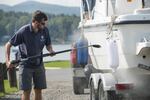Prevention Tips For Gardners
- Recognize the plants that you see. If you see a plant that looks out of place, report it to 1.866.INVADER or at oregoninvasiveshotline.org.
- Don't purchase plants on the noxious weed list. Most non-native plants sold at your local nursery or garden center are not invasive, but educate yourself before you buy and consult with experts to avoid mistakenly introducing invasive species into your garden.
- Remove invasives on your property. Find a local recycler where you can dispose of your yard debris.

Decontamination Station at Willsboro Boat Launch.
Adirondack Watershed Institute
Prevention Tips For Boat Owners
- Inspect. For motorized boats, look closely at the hitch, rollers, motor, propeller, axle and bilge. For non-motorized boats, look along the paddles and the hull. Remove any plants and animals that you find before entering the water.
- Drain and empty. Your motor, wet well and bilge should be entirely drained on land after leaving the water. Never release live bait into the water or release aquatic animals from one waterbody into another.
- Rinse and dry. High-pressure, hot water is ideal for rinsing your boat. A garden hose is an option if there is nothing else available. Then let the boat air dry if possible.
Prevention Tips For Anglers
- Inspect and clean. Be sure to remove any plants, dirt and water from your gear and clothing.
- Dispose of bait properly. Empty your bait bucket on land after leaving the water and never release live bait into the water or release aquatic animals from one waterbody into another.
- Never move live fish from one body of water to another. With the exception of floods, it's human pathways that help invasive species move to aquatic ecosystems — like your favorite fishing hole.
Prevention Tips For Pet Owners
- Don't ever dump your pets. Don't release aquarium fish and plants, live bait or other exotic animals into the wild. If you have a pet that you can no longer care for, contact your local pet store, humane society, veterinarian or other expert for guidance on appropriate and humane options.
- Don't dump your aquarium water into natural habitats. Many aquarium plants are invasive, so if you're going to throw them out, seal them in plastic bags before you put them in the trash.
- Make responsible pet purchases. Many pets may live longer, grow bigger and take more care than you realize. Before you choose a pet, do your research and be sure you're ready to care for it long term.
Prevention Tips For Outdoor Enthusiasts
- Inspect and remove mud from boots, gear and vehicle. Invasive seeds can hitch a ride on your gear, boots and vehicle, so scrape and spray off any caked-on soil.
- Use weed-free hay and local firewood. Avoid carrying invasive seeds into your favorite natural areas by bringing weed-free hay and buying firewood within a 50-mile radius of your campsite.
- Recognize and report invasives. If you see a plant that looks out of place, report it to 1.866.INVADER or at oregoninvasiveshotline.org.

This beagle signals that a piece of luggage contains contraband at Washington Dulles International Airport in Chantilly, VA on March 14, 2001.
Ken Hammond / USDA
Prevention Tips For Consumers And Travelers
- Know the origin of what you're buying. Imported goods are pathways for invasive species, so buy local when you have the option.
- Don't "pack a pest" when traveling. Fruits and vegetables, plants, insects and animals can carry pests or become invasive themselves. Declare all food and plant materials at airports and checkpoints. Many of these items are safe and legal, but let professionals make the decision instead of putting Oregon at risk.
- Don't be a human pathway for invasives. When buying goods packed in crates or wood packaging, take a look. If you see holes or evidence of insects in the wood, report it to 1.866.INVADER or at oregoninvasiveshotline.org.
THANKS TO OUR SPONSOR:
THANKS TO OUR SPONSOR: